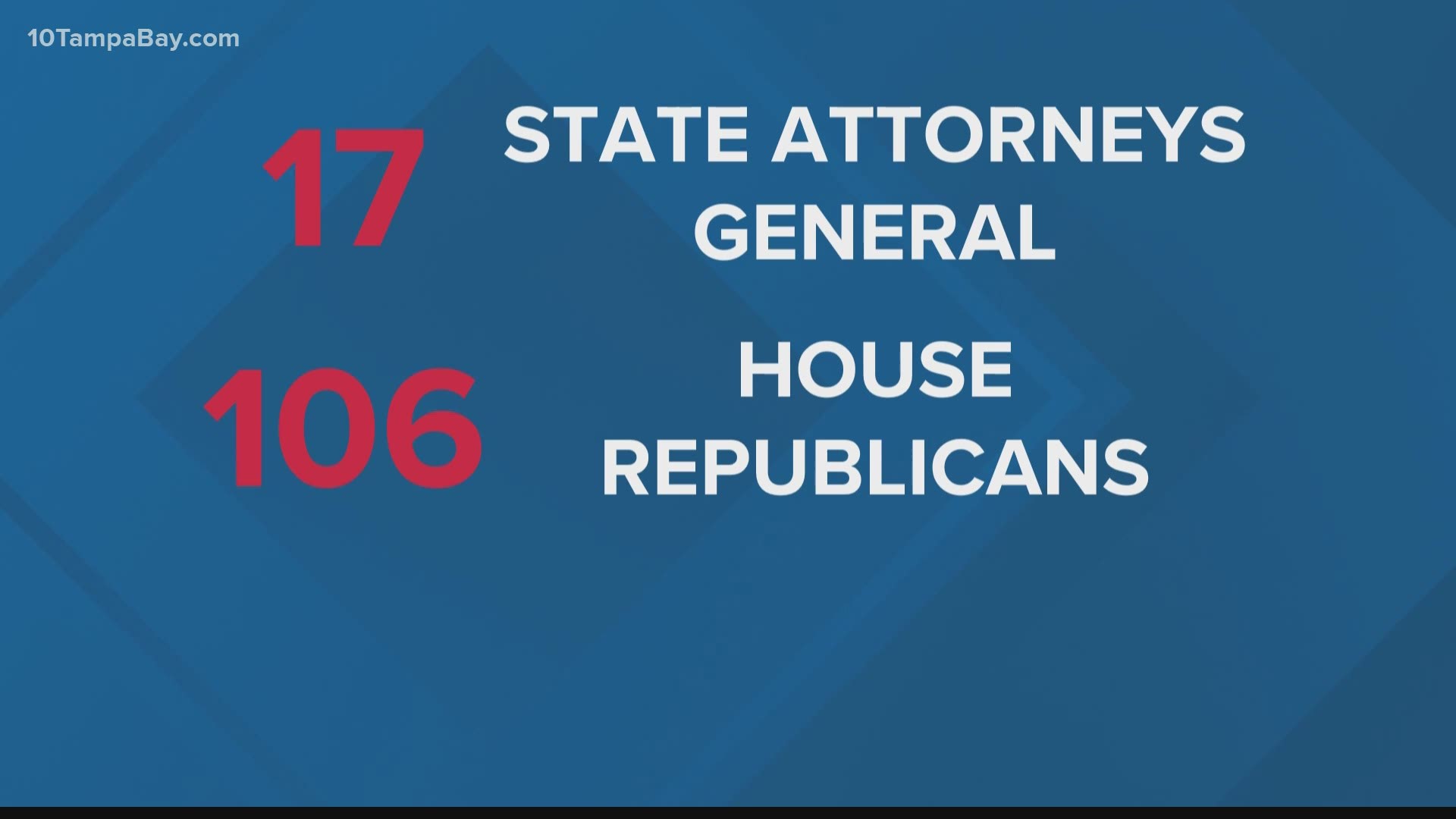WASHINGTON — The Supreme Court has rejected a lawsuit backed by President Donald Trump to overturn Joe Biden’s election victory, ending a desperate attempt to get legal issues rejected by state and federal judges before the nation’s highest court.
Florida had joined the list of states supporting the Texas lawsuit challenging election results in four battleground states. Florida Attorney General Ashley Moody announced on Dec. 9 that the Sunshine State was involved in the amicus brief urging the Supreme Court of the United States to consider Texas' motion. But, the high court did not go for it.
Justices Samuel Alito and Clarence Thomas were the only two justices who felt the court should have heard the case due to it being a state vs. states lawsuit. But, since the case won't be heard, they didn't have the chance to express any viewpoint on the actual merits of the case.
The court’s order Friday was its second this week rebuffing Republican requests that it get involved in the 2020 election outcome. The justices turned away an appeal from Pennsylvania Republicans on Tuesday.
The Electoral College meets Monday to formally elect Biden as the next president.
Below are the claims that were put forth in the lawsuit:
THE LAWSUIT CLAIMS: The four states that Texas is suing “usurped their legislatures' authority and unconstitutionally revised their state's election statutes.”
THE FACTS: Trump and his allies have lost many cases making the argument that only state legislatures could modify election practices during the coronavirus pandemic. This lawsuit rehashes arguments already rejected by courts siding with officials who acted under their respective state laws.
For example, the lawsuit alleges that Pennsylvania “unconstitutionally did away” with “statutory signature verification requirements.” But the Pennsylvania Supreme Court unanimously ruled in October that state law makes it clear only that the ballot envelope requires the voter’s signature, but not a matching signature.
Among the states that changed voting practices without legislative action this year is Texas, which extended early voting by six days due to the pandemic.
___
THE LAWSUIT CLAIMS: Given Trump's lead in the four states “as of 3 a.m." the morning after the election, Biden's chances of winning all four was “less than one in a quadrillion.”
THE FACTS: What sounds like a statistically significant figure isn't grounded in what experts before the election predicted: In-person votes counted more quickly would likely favor Trump and mail-in votes counted later would favor Biden.
Democrats for months pushed voters to submit mail-in ballots that would be counted later, while Trump attacked mail-in voting as fraudulent even though he voted by mail in Florida. Republican legislative leaders in Michigan, Pennsylvania, and Wisconsin all resisted pleas from election officials to update the laws to allow for a speedier count.
The idea that Trump would have large initial leads came as no surprise and does not prove any malfeasance or fraud happened.
___
THE LAWSUIT CLAIMS: There are “facts for which no independently verified reasonable explanation yet exists.”
THE FACTS: Each of the listed "facts” has an independently verified explanation.
A laptop and thumb drives were stolen on Oct. 1 from a city warehouse in Philadelphia. A spokesman for the city elections commission said then, “We are confident that this incident will not in any way compromise the integrity of the election.” The local district attorney said days later that police found the theft was unrelated to the election, according to the Philadelphia Inquirer.
There was briefly a tabulation problem that involved a few thousand votes in Republican-leaning Antrim County, Michigan. But it wasn't caused by voting machines. "There was no malice, no fraud here, just human error,” County Clerk Sheryl Guy said.
And Milwaukee's chief elections official, Claire Woodall-Vogg, did leave behind one flash drive with absentee vote tallies when she was delivering a batch of flash drives to the local elections commission, according to the Wisconsin State Journal. Woodall-Vogg said she called a team member and a police officer delivered the last drive. Despite what the lawsuit says, Woodall-Vogg said the drive was “never left unattended.”
___
THE LAWSUIT CLAIMS: Texas has a right “to demand that all other States abide by the constitutionally set rules in appointing presidential electors to the electoral college.” It says other states are harmed when one state “violates federal law to affect the outcome of a presidential election.”
THE FACTS: Legal experts say Texas has no right to bring the case in the first place because it doesn’t get a say in how other states run their elections and has not suffered any real harm. And even if it did have a legitimate case, it was brought too late, experts say.
“Texas does not have standing in federal court to vindicate the voting rights of other states’ voters — much less standing to undercut the rights of those voters,” Lisa Marshall Manheim, a professor at the University of Washington Law School, wrote in an opinion piece for The Washington Post.
Some Texas Republicans agree. U.S. Rep. Chip Roy tweeted he would not join the case because “I believe the case itself represents a dangerous violation of federalism & sets a precedent to have one state asking federal courts to police the voting procedures of other states.”
- Report: FDA races to grant emergency use authorization for Pfizer's COVID-19 vaccine by Friday evening
- Florida man pays off utility bills for 114 families facing disconnection
- Pinellas nursing homes will be among first to receive COVID-19 vaccine
- Pasco County allows Florida's only snow park to reopen after another safety inspection
- COVID-19 vaccine questions answered
- Here's where to see Christmas lights around Tampa Bay
►Breaking news and weather alerts: Get the free 10 Tampa Bay app
►Stay In the Know! Sign up now for the Brightside Blend Newsletter

